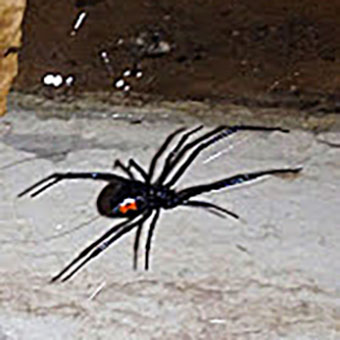Pet Threats Come in All Sizes
Our doggie family ambled along on our typical morning walk along the community trail, enjoying the cool break in Vegas’ oppressive summer heat. With a family of two Labradors and a Yorkie mix, my crew is always up for fun and they investigate anything and everything.
Sometimes it’s a crunchy cockroach snack or the fortunate edible remnant in a discarded candy wrapper. My dogs enjoy the “date game” where they snatch up shriveled fruit fallen from date palms, crunching away before the mom and dad noticed. And sometimes it’s a half-hearted game of chase with an unsuspecting rabbit. A more gut-wrenching episode once involved my Labrador ingesting a rat with a tail slipping down his gullet like a piece of spaghetti. My furry kids are professional trouble finders so I try to keep a watchful eye for things that make them go “Oooh”, and make me go “Ugh!”

Female black widow spider
While walking along the pedestrian pathway we came upon today’s discovery- spiders and lots of them living in the recesses of a block wall. The hairs on my arm stood up as my Yorkie mix approached their lair. I recognize what these spiders are and what could happen to a 16-pound pup.
The long-legged spiders were over 1 1/2” in length, black in color with a distinctive orange hour-glass mark on their underbelly. Meet the black widow spider, a common arachnid found in every state in the U.S. except Alaska.
The Black Widow Bite
Black widow spiders contain a potent neurotoxin that causes pain, and swelling and can lead to paralysis. Female black widows are the dangerous ones, while the males rarely ever bite. While some black widow bites go unnoticed, others cause immediate pain at the site or result in pain at the nearest lymph node. Pain intensity reaches its maximum within 1 to 3 hours after the bite, but can last up to 48 hours.
Symptoms of a black widow bite appear within 8 hours after the bite and include muscle twitching, restlessness, rigid abdomen, and difficulty breathing. Symptoms may result in high blood pressure, a racing heart rate, seizures, and collapse. Dogs are more resistant to a black widow bite but still can suffer a serious illness. Cats are very sensitive to toxins and can suffer fatalities.
Symptoms of black widow bite include:
 Pain and numbness around the bite site
Pain and numbness around the bite site- Anxiety
- Racing heart rate
- Muscle pain and stiffness, especially in abdominal muscles
- Difficulty breathing
- Paralysis
- Seizures
Treatment for Black Widow Spider Bite
Call your veterinarian if you suspect your pet was bitten by a black widow. Initial home emergency care for a black widow bite may include an ice-packing bite area and oral antihistamines like Benadryl. Your veterinarian will need to see your pet to evaluate and treat the more serious symptoms. Treatment may include medications to control muscle spasms and seizures. Blood pressure and blood sugar are monitored and intravenous fluids may be administered. An antivenin is available for more serious confirmed cases of black widow bite.
Prevention
Avoidance of spider habitats is the best prevention. These eight-legged critters favor dark recesses both indoors and outdoors. Look for cobwebs with a distinctive funnel-shaped opening at the top. And keep a close eye on your dog when out exploring. Inquire about spider control methods with your pest control company.
With pet noses so close to web level, the risk of black widow bites is just natural to be a dog. Our morning spider encounter ended without any drama, thankfully. After one firm “No”, my doggies retreated to unearth some other lucky find. Here’s to hoping it doesn’t involve any rats or bugs next time.

